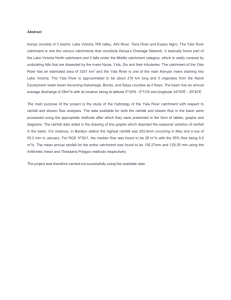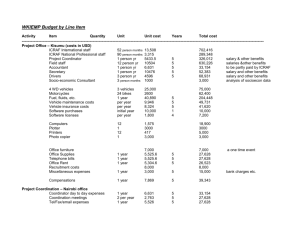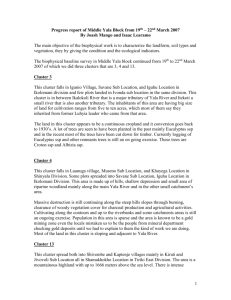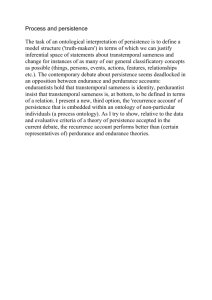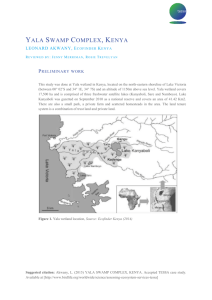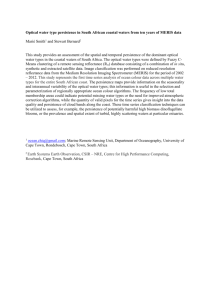Document 10465306
advertisement
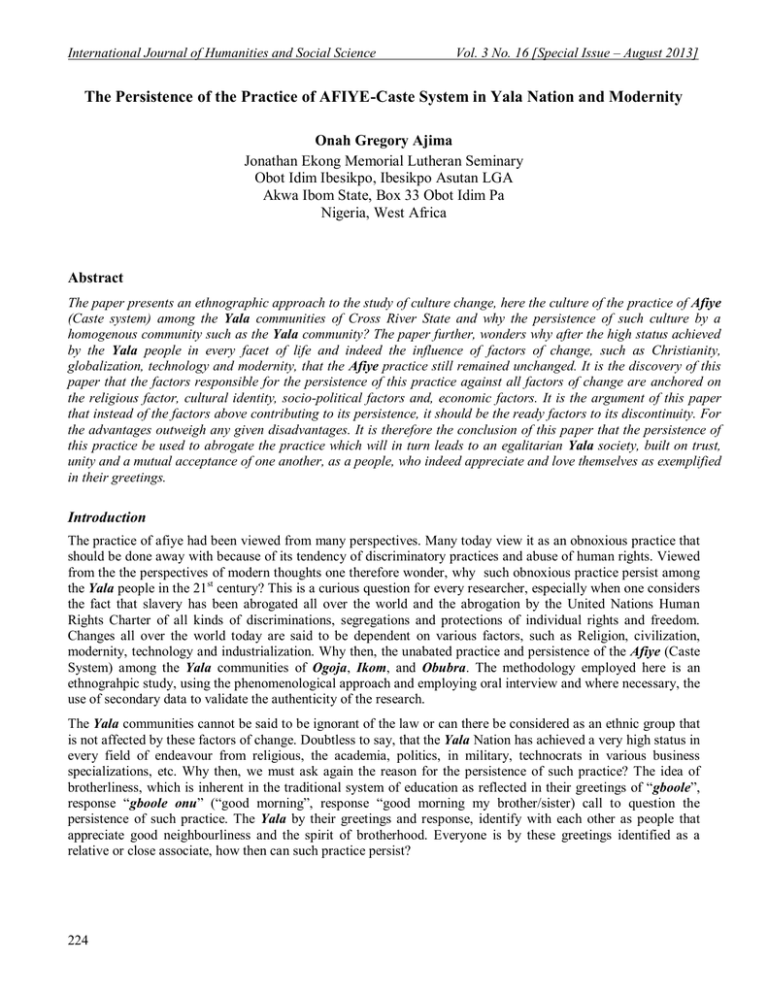
International Journal of Humanities and Social Science Vol. 3 No. 16 [Special Issue – August 2013] The Persistence of the Practice of AFIYE-Caste System in Yala Nation and Modernity Onah Gregory Ajima Jonathan Ekong Memorial Lutheran Seminary Obot Idim Ibesikpo, Ibesikpo Asutan LGA Akwa Ibom State, Box 33 Obot Idim Pa Nigeria, West Africa Abstract The paper presents an ethnographic approach to the study of culture change, here the culture of the practice of Afiye (Caste system) among the Yala communities of Cross River State and why the persistence of such culture by a homogenous community such as the Yala community? The paper further, wonders why after the high status achieved by the Yala people in every facet of life and indeed the influence of factors of change, such as Christianity, globalization, technology and modernity, that the Afiye practice still remained unchanged. It is the discovery of this paper that the factors responsible for the persistence of this practice against all factors of change are anchored on the religious factor, cultural identity, socio-political factors and, economic factors. It is the argument of this paper that instead of the factors above contributing to its persistence, it should be the ready factors to its discontinuity. For the advantages outweigh any given disadvantages. It is therefore the conclusion of this paper that the persistence of this practice be used to abrogate the practice which will in turn leads to an egalitarian Yala society, built on trust, unity and a mutual acceptance of one another, as a people, who indeed appreciate and love themselves as exemplified in their greetings. Introduction The practice of afiye had been viewed from many perspectives. Many today view it as an obnoxious practice that should be done away with because of its tendency of discriminatory practices and abuse of human rights. Viewed from the the perspectives of modern thoughts one therefore wonder, why such obnoxious practice persist among the Yala people in the 21st century? This is a curious question for every researcher, especially when one considers the fact that slavery has been abrogated all over the world and the abrogation by the United Nations Human Rights Charter of all kinds of discriminations, segregations and protections of individual rights and freedom. Changes all over the world today are said to be dependent on various factors, such as Religion, civilization, modernity, technology and industrialization. Why then, the unabated practice and persistence of the Afiye (Caste System) among the Yala communities of Ogoja, Ikom, and Obubra. The methodology employed here is an ethnograhpic study, using the phenomenological approach and employing oral interview and where necessary, the use of secondary data to validate the authenticity of the research. The Yala communities cannot be said to be ignorant of the law or can there be considered as an ethnic group that is not affected by these factors of change. Doubtless to say, that the Yala Nation has achieved a very high status in every field of endeavour from religious, the academia, politics, in military, technocrats in various business specializations, etc. Why then, we must ask again the reason for the persistence of such practice? The idea of brotherliness, which is inherent in the traditional system of education as reflected in their greetings of “gboole”, response “gboole onu” (“good morning”, response “good morning my brother/sister) call to question the persistence of such practice. The Yala by their greetings and response, identify with each other as people that appreciate good neighbourliness and the spirit of brotherhood. Everyone is by these greetings identified as a relative or close associate, how then can such practice persist? 224 The Special Issue on Commerce and Social Science © Center for Promoting Ideas, USA www.ijhssnet.com These values in traditional education is what U.H.D.Danfulani (1996:50), has pointed out, when he opines that traditional system of education inculcates thorough training in trans-survival values like preservation of life, brotherliness, love for kin, obedience to group, generousity, respect for humanity and harmonious human relationship. In an attempt to research into the factors responsible for its persistence, we shall broaden the scope by seeking for answers from the Religious, cultural identity, political, social and economic factors. Religious Factors The Yala traditional society is theocratic, and as C.R.Garba (1975:8) has rightly pointed out concerning a theocratic society, the divinities and the spirits as well as the ancestors participate in a theocratic government. This is the basic factor responsible for the persistence of such practice. The acquisition of the afiye among other rites involved the use use of an object that is administered on those so designated for the caste, be they sold or captured. D.J.Ogar (oral interv.) has named the said object as “Igbaniku”. The effect is believed to passed on from one generation to another of the Afiye, such that one of such great effect is the spirit of being timid and stupid, two factors that Yala detest. This is one great reason why incest persisted among the royal family of Yala Nkum Okpambe, till lately, because they detest a situstion where by by mistake there is a cross breeding between the members of the royal family and the afiye. Another religious factor that has helped in the persistence of this practice of Afiye is the fear centered on the wraths of the gods and the ancestors (the living dead). (Michael Wonah Akpa (oral interview 11-7-2008). Every community in the world has its own norm and values, these norms and values are kept and maintained as very sacrosanct from time immemorial, passed on from one generation to another, as binding rules and regulations. It is a general belief and concept among the Yala that the living do not live in isolation, but always live in communion and in agreement with their ancestors. The ancestors are therefore the intermediaries, serving to protect, to guide, to bless, to fight on behalf of and if necessary punish their posterity that fail to keep to such norms and values. Most importantly, once one is ostracized from the family, for the fact that one has married from or been married into the Afiye family, it is a common belief, that one’s forebear will also deny him or her rights, benefits, privileges of one’s lineage. This is one great religious affirmation that no Yala man would ever dream of, especially when it comes to an act that will severe one’s relationship not only with the living but also the living death. The human activities among the Yala people are strictly watched and guided in order not to provoke to wrath the gods or the ancestors. The typical Yala person, like any other African believes in the moment of despair, threat or agony, they can be called upon to defend, bear witness from certain accusations or protect them. This is the point raised by E.S.Akama (2007:6 ) in his work titled, The Impact of Secularization and Urbanization on the Socio-Religious Life of the African Extended Family:- The Experience of Isoko People to the fact that Africans believe in the continuous existence of human life and that the deceased ruling elders of the lineage in the spirit world still continually see to the well being of the lineages. Every action or actions of the people are therefore conducted in such a manner that they will always be blessed by their ancestors and the gods, either as individuals, family, or in their farming. In case of any seeming violations, sacrifices and cleansing are carried out to avoid the wraths of the gods and the ancestors. Eventhough Christianity had arrived Yalaland as early as 1921, Yala is still tied to its indigenous belief system, and as at now the land is the custodian of about thirty cults, and so according to Onah, Augustine Odey (2002:148), in his work entitled Superstitious Belief And Practices; A Challenge To The Gospel, has pointed out the fact that, this strong affinity account for the resilient, persistence, resistance and endurance of African Cultural Practices that are obnoxious. Cultural Identity Cultural Identity is often cherished by many. This identity often reflects in their dressing, dances, kind of food, worldview and attitudes as well as concept of events, and situations. This value in identity is what Frank Ogodo (2002: vii), has earlier pointed out, when he affirmed that, the history of a given people is a beautiful thing, because it teaches the people who they are. In a research such as this, it will be unscholarly to conclude that the practice of Afiye Caste has no advantage. Therefore one can affirm that one of the reasons for its persistence is hidden in cultural identity, it helps both the Ayiwoole and the Afiye to know their origin, to know the events surrounding their lives, and why in certain circumstances, they are being treated differently from others. 225 International Journal of Humanities and Social Science Vol. 3 No. 16 [Special Issue – August 2013] Since culture involves the total ways of life of a given people, including their traditions, the continuation of cultural practices and traditions of Yala people is one major factor on the persistence of the practice of Afiye in Yalaland. This is today reinvigorated by cultural revivalists, who will stop at nothing to make sure traditional practices are revived in order not to create a lacuna. Frank Ogodo (2002:18), in asserting the persistence of the practice has affirmed thus; The society stipulated particular days of the week, in which only corpses of the freeborn could be buried and any slave who died could not be buried on such days. The slave had their days spelt out for them and could not be buried outside those days, no matter how rich or important such a slave was in the society. This tradition is so entrenched in the society that it exists up to date. This underlying factor as earlier mentioned, why among the Yala Obubra, there was the practice of incest, especially in the royal family, which was aimed at the purity of lineage. This purity of lineage which is part of the people’s culture and tradition is what Ogar Orji (oral interview 28-12-2007), has pointed out that the reason why the Afiye are buried on a different day of the week. According to him, this is done to avoid one group reincarnating into the other which will eventually lead to the contamination of the royal lineage, from which Ogamode are selected from. This also account for why the Yala as an ethnic group abhors inter-marriages between the Ayiwoole and the Afiye. Socio-Political Factors P.Ade Dopamu (1993:16), in his work titled, Traditional Values: a Means to Self Reliance has stated that there can be no coherent social life unless that the social relationship which binds people together are at least to some degree orderly institutionalized and predictable…to maintain an orderly system of social relations, Dopamu noted; people have to be subjected to some degree of compulsion. They cannot, all the time do exactly what they want to do. These rules and the means by which they are enforced differ greatly from society to society. Here lies the socio-political factor of the persistence of such inequality among Yala people. The practice helps the people to understand why certain differences, treatment and classifications have come into being even among human beings, hence leading such members to the bond of common brotherhood. In this brotherhood, they seek for the welfare of one another and also strive for each other’s interest, progress, security and survival, not just as individuals, but as a group, for a slave is not buried with one finger out and the other slave passes by and rejoices (Oko Adoga, oral interview 22-7-2008). It is worthy to mention here that, this is one felt need why people associate, and among the Yala, it account for the persistence of the practice of Afiye Caste. The case of Negroes in the USA is a typical example. Today, President Barack Obama is leading the most powerful Nation in the world, an event that Martin Luther King (jnr) only saw as a dream. The Ayiwoole too, are bound in the same brotherhood hence a fair competition and positive conflict which, it seems to bring about even development to the commuity. Still under the socio-political, it brings about unity in diversity. While in practice, it acknowledges birth related inequalities, it also underlies unity of all Castes as their divine nature, as a product of a cosmic sacrifice, arising from various parts of the universal being. It is worth noting here the fact that those who were given out as slaves were given out for various reasons such as; to be able to save the lives of other people, either in warfare or to protect a given community. Some were however criminals who were sold out in order to keep the social order while some were from outright raids. Generally, one can affirm that the original purpose of the caste system, at least in theory, was not meant to exploit the weaker caste, but to establish social order, regulate the affairs of the people and preserve the laws of the land. All these factors under socio- political factors, often seen as advantages have helped in the persistence of the caste system among the Yala. It is worthy to mention here the fact that these factors affects one’s social standing in the society as well as one’s political aspirations, hence the persistence of the practice. The fact that most of the Afiye seems to be more prosperous and wealthy, creates an uncomfortable situation for the Ayiwoole, who will ensure the strict enforcement through the persistence of the practice of the rules guiding the Afiye as a way of check-mating them. Such derogatory terminologies as Ukpobi (a he-goat with its offensive odour), Ebe (animal) etc, reinforces the proverbial adage of “ene odey omagu o gmo olipu amama nii” as earlier mentioned, this adage reinforces the fact that Afiye are dangerous species of human beings that can and should never be trusted, for with any slight opportunity they are willing to poison and kill the Ayiwoole. 226 The Special Issue on Commerce and Social Science © Center for Promoting Ideas, USA www.ijhssnet.com This therefore account for the slow response that is being given to the Afiye by the Ayiwoole among the Yala communities. In one word, threat posed by the Afiye, socially and politically account for the persistence of the practice. Among the igbos of south east Nigeria, the Late Odumegwu Ojukwu, the Ikemba of Nnewi ( cited in Ely Obasi et al), in one of his political rally, has used it as a political tool by pointing out the fact that there are some species of human beings that are not suppose to speak in public, and that by that he meant those whose forebear are offered to the gods (Osu). Therefore, in order to keep the Afiye with their wealth and often times, their success in education and other endeavours, the persistence of the caste will become the necessary tools often by the Ayiwoole to checkmate them. Economic Factors Principally, the first major reason given by the Yala for the acquisition of Afiye, is for economic reasons. In primordial times, a prominent or wealthy man is known by the number of Afiye that he has acquired. Such Afiye were normally used in farm work, the greater ones farm, the larger the number of Afiye that he will seek to acquire. This is one basic reason why the Afiye are regarded as the property of its owner and that has brought about a proverbial saying among the Yala that ‘oja onye bii lehu nii’ literally translated as ‘one’s property does not get lost from head to head’. In modern times, the Afiye are no more used by its owners for farm work, but they are still regarded as the property or now belonging to the family that brought them. By implication therefore, they have no land to be called their own except, those they share or those that they are given by the Ayiwoole that they belong and therefore one other great economic reason for the persistence of the practice of Afiye is centered on the welfare and protection of the members of the Afiye, which is aimed at giving a sense of belonging. In this wise, members of the caste have accepted, internalized and conditioned their entire existence on this fact, without any sense of seeking for manumission. As earlier pointed out, the Yala communities are purely patriarchal, the acquisition of land, rights, and privileges are equally based on this patriarchal lineage. In a situation whereby any member of the caste cannot be traced to any any of the lineage is tantamount to the denial of land acquisition, either for farming or building, it also ostracized one from all the ritual’s involved in the burial of family members, here lies one of the greatest economic factor that always keep the members of the caste in a deceptive comfort in the family of the Ayiwoole. For a typical example, among the Yala Nkum Okpambe, the Afiye are made to believe that they can be accepted and reintegrated as ayiwoole after the third generation or fourth generation, and can be given an opportunity to be chosen as a traditional ruler, but we must not look at it in the surface and conclude that it is well. The selection of a traditional ruler must begin from your immediate family and in a competitive society we find ourselves today, no true Yala family would want to pick someone, which they know in its true sense, that he does not belong truly to the family. Indeed, as Iyaji Ogar Oche (oral interview 16-6-2011) will point out, the unsaid in the said revocation of discriminations against the Afiye amongst the Yala communities is more than the said. Looking critically at the above statement by Iyaji Ogar Oche one will then conclude that, often times, the modernizations often referred to, are only on the surface, the hidden aspect of this discriminations seems to be greater than the ones made public, to have been abrogated. In its economic persistence therefore, one can conclude that, the strings attached, often to their acceptance or call it victory, only leads to indeed true captivity as the Greek gift of acceptance into the mainstream of the family is only meant to keep them in check economically. Conclusion and Recommendations Looking critically at the factors enumerated above as the factors responsible for the persistence of the practice of afiye, one will invariable notice that it is anchored more on the desire for authority, power and control. For an example the practice of not allowing one caste members to marry across lines, not to be married to or be married by the ayiiwoole had been abrogated by individuals and or often times communities without any consequences from the gods or the ancestor. The fact that such abrogation had not resulted to any knowned disasters or calamity is a clear proof that the abrogation and the fear anchored on the gods of the land and the ancestors are only imaginary. For instance, the yala communities of Obubra and Ikom repectively today conduct their burrial mostly on weekend without recourse to the odd or even days, and not bargaining for any settlements before such burrials. 227 International Journal of Humanities and Social Science Vol. 3 No. 16 [Special Issue – August 2013] It is therefore the submission of this presentation that the reasons for the persistence of this practice in premordial times have been overtaken by events, namely civilizations, development and the new religious factors which have derobed and redressed the gods of the yala communities in modernity and in conformity with the present practices. Therefore, it is time that the reasons adduced for such persistence no longer hold sway and so there is therefore no ground to continue the practice of the caste system for it is the conviction of this paper that the yala nation are bound to progress and achieve more under a united front than a factionalized system that that the practice and persistence of afiye caste have entrenched into the yala society. References ADOGA, Oko Oral Inteerview 22-1-2008 AKAMA, E.S.: (2007) “The Impact of Secularization and Urbanisation on the Socio- Religious life of the African extended family: the experience of the Isoko people” Kiabara, readings on Religion and Culture, University of Port Harcourt, Ozo Mekuri Ndimele (editor) ,M&J Grand orbit, Port Harcourt, P.3 AKPA, Michael Wonah Oral Interview-11-7-2008 DANFULANI, U.H.D. (1996) “Integrating Traditional African Morality into Contemporary Christian Religious Education in Nigeria”Jos bulletin of Religion, Volume 3, no.1, Jos, P.50 DOPAMU, P. Ade. (1993) “Traditional Values, a Means to Self Reliance” Orita Volume XXV NO.1, P.16. GARBA, C. R. (1975) “The African Traditional way of Nation Building”, Orita Ibadan Journals of Religion, Volume IX, no.1, P.8 OBASI, Ely et Al (1989) “Newswatch Magazine” Nigerian Weekly News Magazine: Vol.10 no.12, published by Newswatch Communication, Nigeria. ODEY, Onah Augustine --- (2002) “Superstitious beliefs and practices: A challenge to the Gospel” Uyo Journals of Humanities, Volume 7, P.148 OGAR, Iyaji Oche Oral Interview-16-6-2011 FRANK, Ogodo Ogbeche. Wogada (Ebo) Basic facts to know about Yala Odidoma; Suleja: S. Danjuma printing works ORJI. Ogar Oral Interview- 28-12-2008 228
